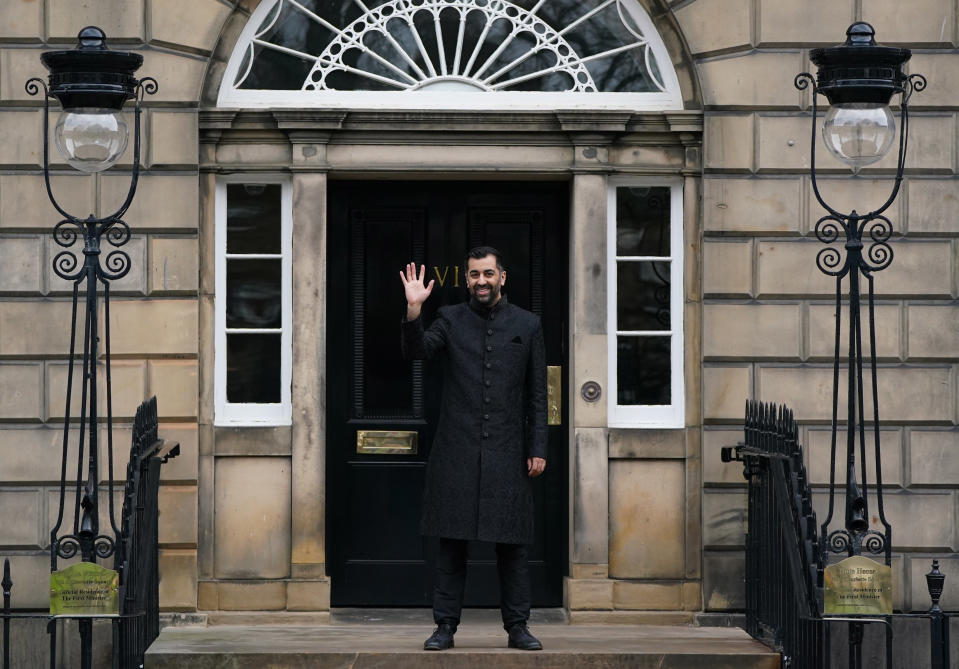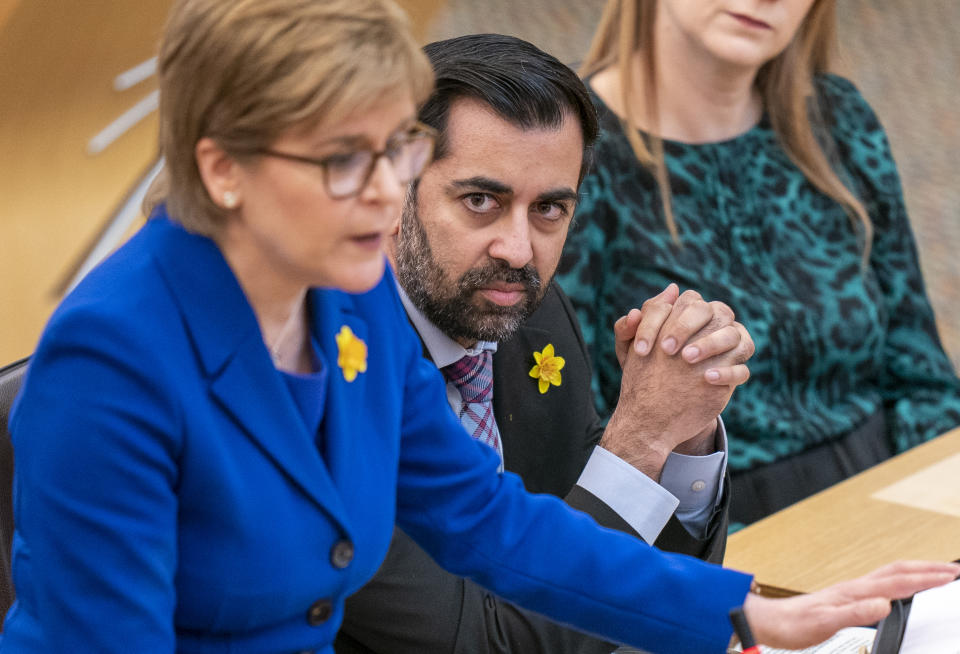Humza Yousaf marks first anniversary as Scotland’s First Minister
While he insists holding the top job in Scottish politics is the “greatest honour” of his life, Humza Yousaf has had a difficult first year as First Minister.
He became Scotland’s youngest ever First Minister, and the first from an ethnic minority background to hold the post, when he was sworn into office on March 29 2023.
That came after he was declared the winner of what had been a bruising contest to succeed Nicola Sturgeon, who announced in February last year she was stepping down as both first minister and SNP leader.
At the time he pledged a “radical, ambitious and progressive policy agenda”.
Now a year into the post he insists his government has achieved “a lot” when it comes to reducing poverty and increasing foreign investment – although he also recognised “there’s still a lot more to do to deliver for the people of Scotland”.
However, speaking earlier this week Mr Yousaf said: “It continues to be the greatest honour of my life, being the First Minister of the country that I’ve been born and raised in, the country I love and the country I’m raising my children in.”
He added that since taking office he has “been focused on leading a party and government for all of Scotland – working for everyone, in communities across the country”.

In a statement released on Thursday, he also sought to make a pitch to voters, saying: “We all want Scotland to be the best place in the world to grow up, and the upcoming election is an opportunity for voters to protect Scotland’s values in the face of further Westminster cuts by voting SNP.
“The SNP is the only party that will always stand up for Scotland at Westminster.”
The First Minister has had some successes in post – with the Scottish Government managing to push through the council tax freeze he had promised, despite two local authorities having initially voted to increases charges.
That freeze however sparked its own controversy – with Mr Yousaf announcing it to the SNP conference in October without first consulting with local government leaders, leaving them enraged.
But by his own admission he has had a difficult time since becoming Scotland’s sixth First Minister and the third SNP politician to hold the role.
After taking on the job in March 2023 he learned the party’s auditors had resigned months previously, with a replacement still needed – although a new firm was appointed to take on the role in May.
More worryingly perhaps, just days after being sworn in, the Police Scotland investigation into SNP finances saw the party’s former chief executive Peter Murrell – Ms Sturgeon’s husband – arrested.

Ms Sturgeon herself was arrested and questioned by detectives in June 2023 – although neither she nor her husband have been charged.
Conceding the investigation has been “one of the most difficult times” for the party, he said earlier this year how it had “clearly” affected public perceptions of the SNP.
That downturn, coupled with a resurgence in support for Scottish Labour, saw Mr Yousaf’s party trounced in the Rutherglen and Hamilton West by-election in October.
Margaret Ferrier comfortably won the seat for the SNP in the 2019 Westminster elections but was ousted from Parliament after breaching Covid rules, becoming the first Scottish MP to be removed from the Commons following a recall petition.
In the by-election that followed Labour clinched the seat thanks to a swing of just over 20%.
October 2023 also lead to the SNP losing another MP, when Dr Lisa Cameron quit the party and defected to the Tories.
She said she suffered from “fear and intimidation” from SNP MPs in the Commons, and after joining the Conservatives said she had to go into hiding, claiming she had been threatened with being “bricked in the street”.
The SNP leader suffered another blow when the Supreme Court ruled against the Scottish Government after it pursued a legal challenge to Westminster for blocking controversial gender recognition reforms passed by Holyrood.
Speaking about Mr Yousaf’s first year in charge, elections guru Professor Sir John Curtice told The Herald: “Fundamentally Humza’s problem is he’s a very nice man who’s intellectually able, but he doesn’t have presence. And nobody can give him presence.”
Scottish Labour leader Anas Sarwar meanwhile said: “Humza Yousaf is a nice guy who’s just not up to the job.”
Mr Sarwar said: “It’s been a year of Humza Yousaf, but it’s been 17 years of SNP failure.
“I think if you look at every area of public policy, it is weaker after 17 years of the SNP and weaker still after one year of Humza Yousaf.”
Scottish Conservative leader Douglas Ross was equally critical, saying: “Humza Yousaf’s first year as SNP leader has been nothing short of a disaster for him, his party and – most importantly – the people of Scotland.
“It’s a tale of independence obsession, abject failures and broken promises, of a First Minister out of his depth and unable to control his feuding, scandal-ridden party.”

 Yahoo News
Yahoo News 
